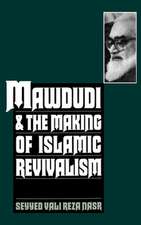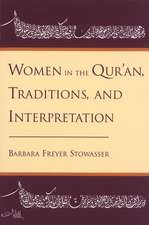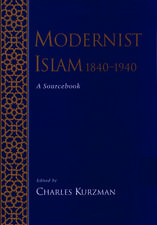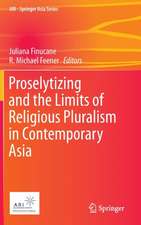Shari'a and Social Engineering: The Implementation of Islamic Law in Contemporary Aceh, Indonesia: Oxford Islamic Legal Studies
Autor R. Michael Feeneren Limba Engleză Hardback – 12 dec 2013
Preț: 630.71 lei
Preț vechi: 902.78 lei
-30% Nou
Puncte Express: 946
Preț estimativ în valută:
120.72€ • 131.18$ • 101.47£
120.72€ • 131.18$ • 101.47£
Carte tipărită la comandă
Livrare economică 11-17 aprilie
Preluare comenzi: 021 569.72.76
Specificații
ISBN-13: 9780199678846
ISBN-10: 0199678847
Pagini: 368
Dimensiuni: 162 x 240 x 28 mm
Greutate: 0.69 kg
Editura: OUP OXFORD
Colecția OUP Oxford
Seria Oxford Islamic Legal Studies
Locul publicării:Oxford, United Kingdom
ISBN-10: 0199678847
Pagini: 368
Dimensiuni: 162 x 240 x 28 mm
Greutate: 0.69 kg
Editura: OUP OXFORD
Colecția OUP Oxford
Seria Oxford Islamic Legal Studies
Locul publicării:Oxford, United Kingdom
Recenzii
Shari'a and Social Engineering is a major accomplishment. Michael Feener has succeeded to combine an authoritative intellectual history with an unrivaled expertise and fascinating insight into the contemporary state Shari'a legal system in Aceh. There is no doubt that this book will become a standard reference in the study of Islamic law, the relevance of which reaches far beyond the study of Aceh or Indonesia alone.
Notă biografică
R. Michael Feener is Research Leader of the Religion and Globalization Research Cluster at the Asia Research Institute and Associate Professor of History at the National University of Singapore. He has also taught at Reed College, and the University of California, Riverside. He has been a visiting professor/ research fellow at Kyoto University, École des Hautes Études en Sciences Sociales, the University of Copenhagen, The Doris Duke Foundation for Islamic Art, and the International Institute for Asian Studies. His books include Muslim Legal Thought in Modern Indonesia, From the Ground Up: Perspectives on Post-Tsunami and Post-Conflict Aceh (with Patrick Daly & Anthony Reid), Mapping the Acehnese Past (with Patrick Daly & Anthony Reid), Islamic Connections: Muslim Societies of South and Southeast Asia (with Terenjit Sevea), Islamic Law in Contemporary Indonesia: Ideas and Institutions (with Mark Cammack), and Islam in World Cultures: Comparative Perspectives.

































